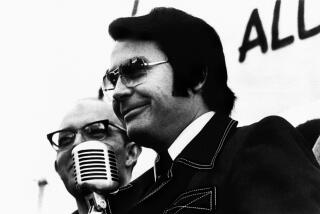On TV, the Only Religion Is Selling
- Share via
“Nothing Sacred”--finally, a show bold enough to reveal the true agenda behind much of what we see on television: Nothing is sacred.
Not our loves, our losses, our illnesses, our institutions, not even our faith. Everything is fodder for exploitation in the market’s quest to sell us products.
So the producers of television entertainment pull our visceral strings in order to make us dig deep into our pockets and fill the coffers of their High Priests: the countless corporations that spend billions to convince television audiences their products make life better, sweeter, worth living.
Make no mistake, these sponsors are not pumping money into television simply because they want to amuse, entertain or inform the audience. Those are merely the bait, masking the hook.
They want the shows they sponsor not only to guarantee them recognition among a targeted audience, they also want those shows to inculcate their audience with values and sensibilities geared toward making them good, obedient little consumers who won’t allow reason or ethics to interfere with their purchasing decisions.
So between those “gripping” medical dramas that exploit the suffering of the sick and dying, we see commercial after commercial urging us to Oil of Olay our wrinkles away, or Color Me Beautiful with hair dye lest we too be numbered among the fragile, the aged and the dying.
Or, while watching those “hard-hitting” crime docudramas where might makes right with every fist thrown and bullet fired, we are reassured by the shows’ sponsors that we can escape our frightening urban jungles safely within the confines of a manly 4-by-4.
Every sitcom in which clowns pose as teachers and fools flounder as fathers and quippy, crude remarks pass as real communication, viewers are told to “Just do it,” “Crack open a cold one,” “Don’t hate me because I’m beautiful,” “Slim-Fast,” “Diet-Rite,” “Get yourself Zestfully clean,” “Get your clothes dazzling bright” and “Reach out and touch.”
Each and every message is carefully crafted to promise the one “commodity” human beings have a biologically hard-wired need for: acceptance.
In this quest to indoctrinate the faithful viewer in the catechism of consumerism, nothing is sacred. Everything is sacrificed to accomplish this end. Feelings are substituted for reason, lust for love, sentimentality for compassion, popularity for community, gluttony for gratitude and, most of all, material acquisition for spiritual enlightenment.
*
With this perspective in mind, discern the message behind this melodramatic statement made by the hip, happening priest in the new show “Nothing Sacred”: “I don’t want to hear any more confessions concerning sexual indiscretions. I’m not a sexual traffic cop.”
In show after show, viewers are told in overt and covert ways that parents, teachers, ministers, rabbis and priests have no business discussing the ramifications of human conduct. Apparently, that is a job best left to the entertainment industry and its sponsors.
To those who claim that television informs and enlightens its viewers about important issues through shows whose characters grapple with AIDS, or poverty, or abuse, or racism, or gang violence, or mental disabilities, or moral and ethical dilemmas, I say the opposite is true. These shows feed our passivity by lulling us into believing that because we watched it on television, we have gained real-world knowledge of the experience depicted.
If you want to understand the suffering endured by AIDS patients, volunteer at a local hospice.
If you want to curb gang violence, volunteer at the local Boys & Girls Club.
If you want to show compassion for the poor, serve at a food bank.
If you want to alleviate the loneliness of the aged and mentally disabled, visit your local convalescent home.
And if you want to grapple with the moral and ethical questions of our day, don’t watch ham actors wring their hands in moral angst. Instead, join a place of worship where you will encounter real, flesh-and-blood people who are struggling to live in accord with their convictions.
And for God’s sake--indeed, for your own sake--don’t let the two-dimensional banality of television serve as your barometer for reality. If you do, you will truly come to believe that nothing is sacred.
More to Read
The complete guide to home viewing
Get Screen Gab for everything about the TV shows and streaming movies everyone’s talking about.
You may occasionally receive promotional content from the Los Angeles Times.






